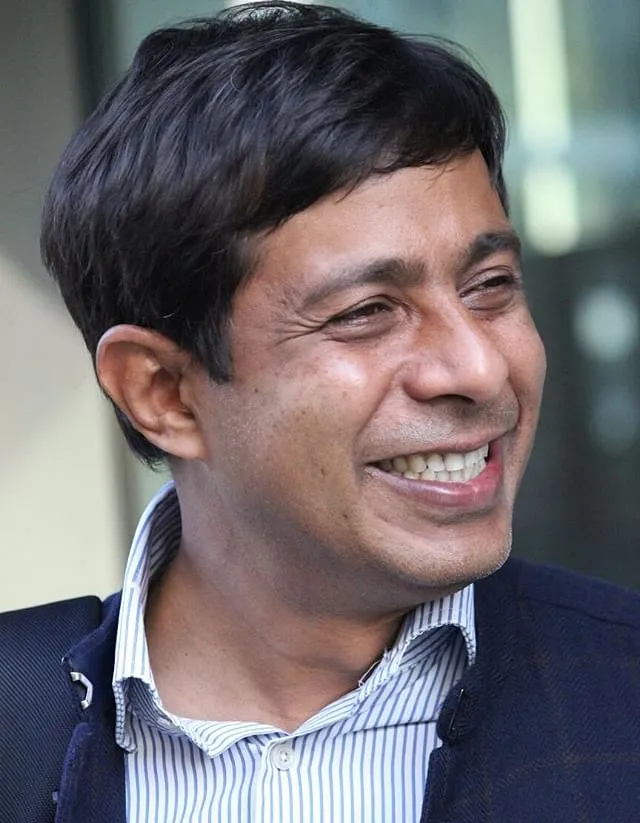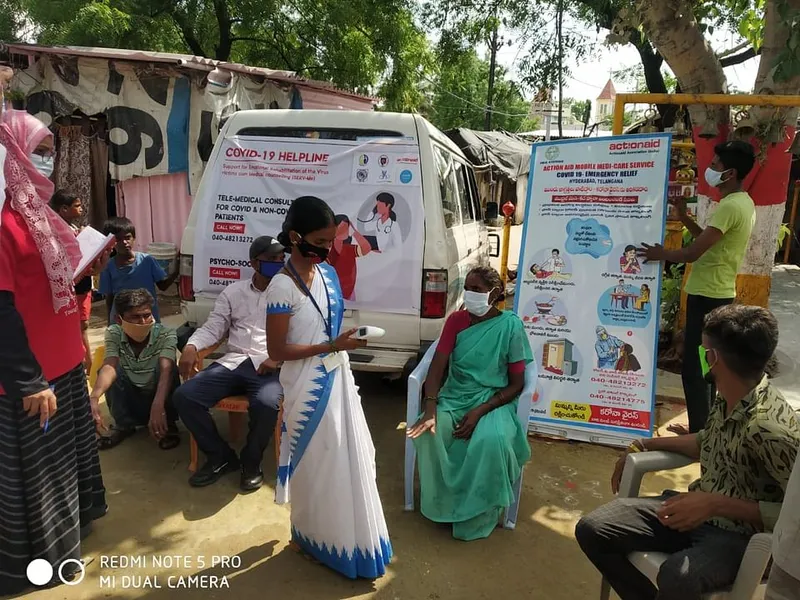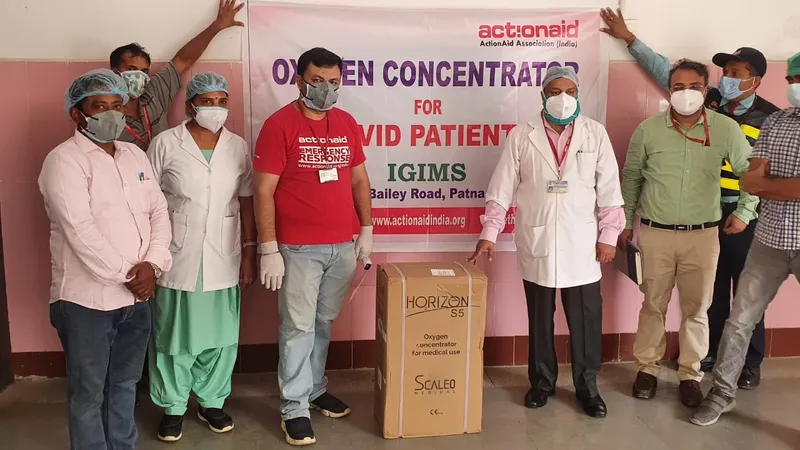Sustainability Agenda: How ActionAid India is working to mobilise marginalised communities and save lives during the pandemic
Sandeep Chachra, Executive Director, ActionAid India, speaks to Social Story about the work that the global agency is doing across 24 states in India, including the long-term interventions during the pandemic.
It’s been nearly 18 months since the COVID-19 pandemic hit the world and we are is still coming to terms with the aftershocks. Amidst all the headlines of infection rates, vaccine wars and death tolls, one statistic has fallen under the radar – the pandemic’s impact on poverty.
The World Bank estimates that across the globe, over 115 million people will be pushed into extreme poverty, and that number could rise to as high as 150 million by 2021. In India alone, over 68.8 percent (812 million) of the population already lives on less than $2 a day.
“None of us anticipated the second wave and the severity of it,” says Sandeep Chachra, Executive Director, Action Aid India, speaking to SocialStory. The global agency, which supports social and ecological justice in 40 countries, has been actively engaging with India’s most marginalised communities since 1972.

Sandeep Chachra, Executive Director, ActionAid India
“We are active in 24 states and two union territories where our teams are located. We work with the most vulnerable sections of society. This include informal daily wage workers in urban areas, landless labourers, small farmers in rural areas, Dalit communities, religious minorities, and tribal communities,” says Sandeep, adding that communities that were criminalised under British rule such as tribal groups, pastoralists, and nomadic tribes continue to face social stigma even today.
ActionAid India’s work with these communities is strongly focused on women and children. “We encourage women to take leadership positions and children to participate in planning and implementation activities in the community, ” he says.
Special attention is also given to protecting children from forced labour and child marriage, while emphasising the need for access to nutrition, health, and education.
“We work directly to build leadership capacities of vulnerable communities, and with grassroots civil society organisations. This helps them engage with local administrations to lead development processes in their localities, while meaningfully claiming the rights and entitlements that are due to them in our welfare state. We also work to achieve social and ecological justice for the communities who are willing to work with us,” says Sandeep.
Ecological justice and equity
According to the research paper Ecosystem restoration: challenges and opportunities for India (Kripal Singh, Rana Pratap Singh, Shri Krishna Tewari), there are 96 million hectares of degraded land in India.
Sandeep says that the maximum impact of this loss of land has also been on small farmers, landless labourers, tribals, and other forest-dwelling communities, pastoralists, and fisherfolk, who are entirely dependent on ecological resources for their sustenance.
“These are the village commons, pasture lands, forests, and water bodies such as rivers, lakes, ponds, or reservoirs. ActionAid Association strongly advocates the need to rest the custodianship of all ecological resources in the hands of local communities,” he says, adding that the legal frameworks are in place, but need better implementation.
“The Forest Rights Act (FRA), the provisions of the Panchayats (Extension To The Scheduled Areas) (PESA) Act and the Constitutional provisions under the Sixth Schedule, all point in this direction. These need to be made effective and extended to pastoralists and small-scale fisherfolk to include rights to collective minimum landholding and use of water bodies for sustainable fishing. ActionAid Association has been tirelessly advocating for this, and we have helped many thousands of families and communities claim rights under the FRA, trained many panchayat members on the PESA, and worked with tribal and other communities who were being displaced from their lands.”
“We have conducted research on how communities need to be involved in conservation and environmental protection efforts because their on-ground presence can support government efforts,” he says.
ActionAid has also been working with communities across drought-prone regions in Maharashtra’s Marathwada region, Uttar Pradesh’s Bundelkhand region, Odisha, Bihar, and Jharkhand in watershed management, rain water harvesting, and revival of ponds and lakes.

In collaboration with the District Medical and Health Department, Hyderabad, ActionAid Association launched a mobile medical care service to provide primary care and COVID vaccination in urban localities of informal workers.
“Amongst the urban poor, we have campaigned for reviving water bodies as urban commons and spread the message of clean air and green cities to sensitise city administrations. We want to build a nationwide campaign on water commons to mobilise water volunteers across the country to ‘Act for Water’, i.e., for the right to water, and to ensure that water bodies are kept clean and vibrant as an ecological resource for the benefit of all life,” he says.
Agents of change
Women, especially those in rural areas, have traditionally played a key role in the sustainable use and conservation of biodiversity, and are amongst the worst affected by environmental degradation due to their reliance on healthy ecosystems to sustain their families. However, their voice, when it comes to decisions surrounding the environment and access to land and water resources, is severely limited.
ActionAid is building organisations of “single” women to assert their rights, especially the right to property.
“We have been able to secure policy advances in a number of states and have recently submitted pointers for a possible national policy to the appropriate policy-making bodies. This includes women’s wage watch groups across the country to help women workers come together on issues of concern, especially wages. We have encouraged women workers to build collectives, and register unions wherever possible, to raise issues as workers with employers and the state,” says Sandeep.
Building feminist leadership is core to all the projects, campaigns and engagements that ActionAid Association engages in.
“This includes encouraging women’s leadership in all community structures and processes while ensuring that feminist principles are also adopted by men and boys in the community and amongst community leaders,” Sandeep says.
He says women in the village and local committees act as first responders to cases of violence, including domestic violence. ActionAid Association is also working closely with the National Commission for Women and State Commissions for Women, the Ministry of Women and Child Development, and Departments of Women and Child Development in State Governments.
It has collaborated with the Government of Madhya Pradesh to set up a ‘one- stop crisis centre’ (OSCC), Gauravi, in Bhopal and is helping to sensitise police and staff of other OSCCs on how to support survivors of patriarchal violence.
In Uttar Pradesh, ActionAid Association is training and monitoring staff at the Asha Jyoti Kendras (the state’s OSCCs) and has created SOPs for them.
“We also run a Beti Zindabad campaign that started as a reaction to the declining sex ratio revealed in the 2011 census. Working with the UNICEF, we are strengthening both community and local administration structures and processes to end child marriage, and to ensure that girl children do not drop out from school. We work with young urban women in many states, and in fact our work in Kashmir is almost entirely supported by a courageous group of young women there,” he says.
Impact of COVID-19
Sandeep admits that COVID-19 has significantly impacted the work they do.
“We suffered personal loss as well, as three of our colleagues succumbed to COVID, more were hospitalised and many were infected. Despite this, our colleagues continued their selfless service. Even with our offices closed during the lockdown, our relief efforts had to continue, uninterrupted.”

ActionAid Association team handing over 25 oxygen concentrators to the Indira Gandhi Institute of Medical Sciences, Patna. This was donated by Pratidhwani, a US-based non-profit mobilising resources for COVID response in India.
ActionAid used virtual forums for coordination and quick decision making across districts and states to ensure regular and quick response planning and decision making.
“In a sense, we were able to broaden our decision-making processes because virtual meetings allowed us to connect across geographies and functions on a more regular basis,” he says.
“The two waves of COVID caught us by surprise. But we have responded as best as we could, and by August 2020 were able to provide 77 lakh people with lifesaving supplies, dry rations, cooked food, and sanitation materials, and many more with information and awareness. ”
Sandeep says that the focus during the second wave was largely on medical aid. “We started helplines to provide authentic information for people in need, including medical advice. By end-June 2021, we had set up around 81 helpdesks across more than 80 districts in 20 states and two union territories. Some of these helplines were national. More than 32,000 calls were received and we were able to help around 28,000 people. We are running major awareness programmes across 200 districts to inform people about COVID-appropriate behaviour and the need for vaccination.”
ActionAid is also focussing on long-term interventions. “We realise that achieving universal vaccination at the earliest, is the only long-term solution to the COVID-19 pandemic and its evolving variants. To this end, we are working with district administrations to run vaccination camps so that nobody is left out of the vaccination drive. We are campaigning with the slogan ‘No one is safe till everyone is’. We have been able to reach about 10 lakh people with our vaccine promotion programmes, and have run vaccine camps in Uttar Pradesh, Uttarakhand, Odisha, Rajasthan, Hyderabad, and Bihar,” he says.
Action Aid has already provided and set up more than 7,000 oxygen concentrators in Primary Health Centres, Community Health Centres and public hospitals across around 200 districts in 15 states.
“In anticipation of a new wave that could also affect children, we are helping to set up COVID-19 care centres for children across many states.”
Sandep says learning from the COVID-19 pandemic is key to building a new future based on the principles of justice and equity. “With this objective in mind, ActionAid Association is also striving to bring back on the agenda the unfinished tasks that the COVID-19 pandemic has exposed. We need to address the crisis in agriculture, issues around land rights, community control of ecological resources and promoting co-operatives in farming and non-farm livelihoods to revive rural economies.
“We also need to address the world of work and ensure the rights of informal workers and people dependent on the informal economy. We specifically need to ensure social protection for all workers, decent work, equal pay, and an enabling environment for women workers.”
Edited by Teja Lele


![[Sustainability Agenda] How The Habitats Trust is trying to change the approach to conservation in India](https://images.yourstory.com/cs/5/f5a7f3304b1211e9b6645b8ae897d03e/Imagecnz9-1626266357870.jpg?fm=png&auto=format&h=100&w=100&crop=entropy&fit=crop)
![[Monday Motivation] Meet the women who are pioneering change in a traditionally male-dominated profession](https://images.yourstory.com/cs/5/f5a7f3304b1211e9b6645b8ae897d03e/MM-1627194083164.png?fm=png&auto=format&h=100&w=100&crop=entropy&fit=crop)
![[COVID Warriors] How Mercy Mission brought a group of NGOs together to provide food, ration, beds, oxygen, and dignity in death amid the pandemic](https://images.yourstory.com/cs/5/98c65090592f11ea9f62339ce853ca75/Imagenxli-1623336880916.jpg?fm=png&auto=format&h=100&w=100&crop=entropy&fit=crop)




